Global IRTS Community of Practice
Good examples























































Sharing practical experiences – solutions, failures and challenges – is the fastest way to improve.
In the field of integrating refugees and forcibly displaced persons through grassroots sport and recreational physical activities, there are no fixed universal solutions. The realities are different – both for the refugees and forcibly displaced persons themselves, and for the host communities.
In this Community of Practice, practitioners from over 60 entities with hands-on experience of addressing the physical, social and mental challenges faced by refugees and forcibly displaced persons have shared their insights. Across four geographical regions, Europe, North America, Latin America and the Middle East, people met online and discussed topics such as mental health and psychosocial support (MHPSS) and stress relief, learning through play, and host community integration.
Thank you to all the entities and individuals who contributed to the Global IRTS (Integration of Refugees Through Sport) initiative, and for sharing your knowledge and expertise in order to reach more people in difficult situations with life-enhancing practices.
Mogens Kirkeby, ISCA President



























Click on a region to explore
EUROPE
German Olympic Sports Confederation (DOSB)
Hellenic Olympic Committee (HOC)
Metadrasi
INTER’ACT
Organization Earth
Scort Foundation
Skateistan and Open Boarders Network
UNHCR
Center for Healing and Justice through Sport
COMPENSAR
Glasswing International
Fundación Deportiva Elina Morales
Fútbol Más
GAME KLABU Foundation
The organisations presented here are examples of good practice that participated in this EU-funded project. Due to time and resource constraints, not all regions could be covered equally. This collection is therefore not intended to be representative or exhaustive, but specific to the scope of this project. In the future, a similar exercise may be carried out in regions that were under-represented here.
German Olympic Sports Confederation (DOSB)
Hellenic Olympic Committee (HOC), Metadrasi
INTER’ACT
Organization Earth
Scort Foundation
Skateistan and Open Boarders Network
Ukraine Active
UNHCR












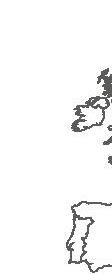







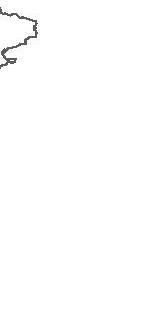


















Name of organisation
German Olympic Sports Confederation (DOSB), Hellenic Olympic Committee (HOC), Metadrasi
Country or countries of implementation
Greece
Website of organisation (or initiative)
https://www.dosb.de
https://www.hoc.gr/en/hellenic-olympic-committee/ https://metadrasi.org/en/
Topic relevance
Community development/inclusion
Steps and process to follow in the implementation
The Hellenic Olympic Committee (HOC) and the German Olympic Sports Confederation (DOSB) have jointly undertaken the supervision and implementation of a diverse sport education offer.
All children and young people have the opportunity to participate on a regular basis in sport activities and events, in various types of sport. The programme also includes recreational and cultural activities of an educational nature (visits to museums, archaeological sites, sport facilities, etc.) which Metadrasi is coordinating.
The sport programme is implemented in each municipality separately, in accordance with the age groups of the participants.
Short description of the practice
The main aim of the project is, using sport as a social institution, to give asylum-seeking children and young people the chance to get in touch with and learn more about organised sport, but also to develop relationships through sport with their peers from the local communities. The project, which is offered free of charge, is addressed to asylum-seeking children and young people aged 7–21 and their peers from local communities. Together in Sport is implemented with the support of cooperating municipalities in Attica and the rest of Greece.
Capacity-development/empowerment of local actors
Capacity development workshops on topics such as disability sport, psychological first aid, Olympic values, etc., are delivered for the coaches and volunteers who take part in the project.
Lessons learned and tips & tricks
Looking back after almost five years of implementation, I would underline the importance of continued support and a multi-stakeholder coalition with diverse expertise from the public and civil society sectors. All partners contribute their different expertise to one overall goal — including people with a refugee background in society through sport.
Additional resources:
https://www.youtube.com/watch?v=AWoHLWFD9aU&list=PLuoeaa5a6DOk7wc1wNB66vtO34PSsISGd&index=3&t=1s
https://www.youtube.com/watch?v=SJbPHGbMoZ0&list=PLuoeaa5a6DOk7wc1wNB66vtO34PSsISGd&index=1



























Name of organisation
INTER’ACT in France
Country or countries of implementation
France
Website of organisation (or initiative)
https://www.unhcr.org/fr-fr/evenements/ interact-avec-les-collegiens
Topic relevance
Learning through play, community development and community inclusion
Short description of the practice
INTER’ACT is an awareness-raising programme on forced displacement that gathers refugees and students to create encounters, explain the journeys and issues refugees face and highlight the importance of their protection. It designed an immersive one-day event where students hear vivid refugee testimonies, explore forced displacement with UNHCR and engage in workshops on sport, arts and music with refugee volunteers. INTER’ACT also aims to provide teachers with refugee educational tools and resources. Among these, sport engagement stood out as a powerful means of connection, making it a promising area for further development in INTER’ACT’s future implementations.
Implementation
Steps and process to follow in the implementation
UNHCR identified refugee speakers and supported their participation in the activity, as well as supported, designed and organised the one-day activities.
• UNHCR identified refugees to share personal growth stories about how sport strengthened their resilience and to carry out various sport workshops with teenagers.
• UNHCR created publication outputs, including a series of sport educational tools, news articles, videos, social media influencer communications and media cooperation.
• UNHCR conducted a post-event social impact interview and study to assess the sustainability of INTER’ACT.
Lessons learned and tips & tricks
The impact of sport on refugee integration: The sport workshops helped strengthen the physical and psychological bonds between students and refugees while raising awareness among young people about the challenges faced by refugees.
• The importance of personal testimonies: The refugees’ stories, shared during the workshops, had a significant impact. They allowed students to better understand the reality of refugees’ situations and gain insight into their resilience and the difficulties they face.
• The involvement of local actors: Facing capacity challenges in human resources, financial and logistical aspects, UNHCR prepared a transition plan from direct implementation to indirect coordination support. Based on a well-established foundation of collaboration with local authorities and local sport associations, UNHCR identified and trained partner sport associations in advance, which secured the handover and the sustainable expansion and implementation of INTER’ACT in the future. In addition, depending on budget and venue constraints, different event formats can be adopted.






















Capacity-development/empowerment of local actors
In 2024, as sport workshops generate more positive feedback, one of the associations, Kabubu, which has demonstrated the best results in terms of refugee integration through sport, was selected to continue implementing the INTER’ACT programme. Based on various factors, UNHCR plans to gradually hand over this initiative to sport associations while maintaining close cooperation and ensuring continuous implementation. From 2026, Kabubu will take full responsibility for the deployment of the programme
UNHCR will then focus on training and supporting partner associations, developing pedagogical resources and collaborating with public institutions.
In 2027, the transition will be complete, with partners fully managing the project, ensuring its long-term sustainability and impact.
Additional resources
INTER’ACT with middle school students - UNHCR France
INTER’ACT à Monaco : Le rôle de sport comme levier de développement et de paix - UNHCR France
Impact Evaluation of the Inter’Act Program - UNHCR France
https://www.unhcr.org/fr-fr/ressources-pedagogiques
UNHCR France has created two educational resources focused on sports to help students and their teachers understand the importance of sport: https://www.unhcr.org/fr-fr/media/le-sport-un-levier-puissant https://www.unhcr.org/fr-fr/media/decouvre-lhistoire-de-bruno





Name of organisation
Country or countries of implementation
Website of organisation (or initiative)
Organization Earth Greece https://www.organizationearth.org/
Topic relevance
Community development / Community inclusion
The Sport and Growth project adopts a holistic approach that designates sport as the core component, combining it with education on health, digital literacy and green skills, activities that connect beneficiaries with host communities, and sessions that equip them with valuable professional skills. Implementation includes regular outreach to the population, community meetings and bilateral meetings with the camps’ management staff, the NGOs that manage the unaccompanied minors’ shelters, and the competent authorities of the Ministry of Migration and Asylum, to ensure that everything runs smoothly and according to the project plan.
Organisation Earth has a long-standing collaboration with the Barça Foundation implementing sport for development projects for refugee children in Greece. The current version of the project, called Sport and Growth, targets refugee children residing in Ritsona (Evia Prefecture) and Schisto Refugee Camp (Attica Prefecture), as well as unaccompanied minors living in designated shelters in the Athens urban area. Sport and Growth aims to improve the overall well-being of over 300 refugee children and 300 unaccompanied minors through regular Sport Net sessions (training sessions based on a methodology developed by the Barça Foundation) and environmental awareness workshops.
In addition, the project fosters beneficiaries’ inclusion and integration into the host society through community-based activities, health promotion workshops and education on digital literacy and professional skills. The training sessions take place twice per week in Ritsona and Schisto, and once per week for the unaccompanied minors, and are centred around football in a way that promotes positive values such as ambition, solidarity and teamwork.
Several external partners are involved, including state authorities (the competent ministry, the management staff of the refugee camps), NGOs that run unaccompanied minors’ shelters, the Medical School of Athens and many ad hoc collaborators.
Lessons learned and tips & tricks
The first lesson concerns the continuity that must govern programmes which seek to support the refugee population and ensure their sustainability. This is crucial both to maximise their impact and to avoid any feelings of loss or abandonment that could otherwise arise among beneficiaries in the case of ad hoc activities or projects that abruptly cease operations. The second lesson concerns the participatory and open characteristics of projects that assist the refugee population, which should always respect the beneficiaries’ right to be heard and establish effective mechanisms for obtaining their feedback.



























Name of organisation
Scort Foundation
Country or countries of implementation
Lebanon, Rwanda, Mexico, Colombia, Poland, Ukraine, Romania, Ecuador, Uganda
Website of organisation (or initiative)
https://scort.org/en/
Topic relevance
The Young Coach Education is a grassroots football coaching programme jointly delivered by Scort, the Football Club Social Alliance partner clubs and local partners. It consists of 12 training days divided into three modules, with two conducted on site to emphasise practical learning and leverage the expertise of FCSA instructors. During these modules, young coaches, teachers, NGO staff, sport coaches or social workers who deliver social activities for underprivileged children in their communities receive essential tips and tools to engage effectively with children. Between the on-site modules, young coaches apply their learning within their communities, independently putting their new skills into practice. During this period, they also complete a three-month online module that covers additional topics to reinforce and expand their knowledge on locally relevant issues (e.g. health promotion, conflict management, psychosocial support).







The following steps are followed to implement the Young Coach Education programme:
1. Needs assessment and partner engagement: Scort staff conduct an assessment trip, building on previous research and engagement with local organisations to identify commu nity needs and opportunities
2. Participant selection: young coaches are selected with the support of local partners
3. Delivery of the education: the education is delivered with FCSA and local partners to address challenges identified in specific communities
4. Monitoring and evaluation: activities allow progress to be monitored, learning to be captured and projects to be enhanced
5. Follow-up education: a follow-up training is organised a couple of years after the initial education to guarantee sustainability. The four-day refresher reinforces the skills of young coaches and their peers in delivering educational games and introduces them to new topics
The practice supports the capacity development and empowerment of the young coaches by providing them with the necessary skills, knowledge and tools to lead and sustain activities in their communities. Moreover, participants are given the opportunity to train peer young coaches, creating a sustainable sharing of knowledge and leadership within their communities.















Capacity-development/empowerment
• Grassroots football initiatives as a powerful tool to convey educational messages
• Capacity building of local actors to ensure sustainability
• Inclusive approaches to ensure that marginalised groups are included
• Collaborative approach to ensure expertise is leveraged
Additional resources:
https://scort.org/en/young-coach-education/





Name of organisation
Skateistan and Open Boarders Network
Country or countries of implementation
Germany, South Africa, USA
Website of organisation (or initiative)
https://www.skateistan.org
Topic relevance
Community inclusion
Short description of the practice
Skateistan’s Open Boarders Network engages skateboarding projects across the world to come together and address the challenges and opportunities related to the inclusion of displaced communities in skate programmes globally. We are, first and foremost, creating the space for these projects to connect and problem-solve together — something that had never been done before. We are also working to address the gap in resources that exists for the inclusion of displaced communities in skateboarding programmes. Our goal is to create simple and practical resources that can be used by skate coaches worldwide in their sessions — resources that are easy to translate, adaptable to different contexts, and that support skate coaches to work in a trauma-informed way in order to best assist their participants.
The resources are primarily focused on fostering belonging and a sense of togetherness for participants — person-centred methods for checking in, skate games for cooperation and teamwork, creative ways to overcome language barriers, etc. As of 2025, the Network consists of 18 social skateboarding projects working in 16 different countries.
We also have a seed funding and support fund called the Open Boarders Sibling Fund, which fosters meaningful partnerships between like-minded skateboarding initiatives supporting displaced youth, enabling them to learn from and support each other. It also provides crucial funding to help emerging projects get off the ground or to support established projects to engage displaced youth in their existing skate programmes.
Open Boarders Network:
• Create space for social skate organisations engaging displaced communities in skate programmes to formally document their knowledge and expertise, sharing challenges, learning points and problem-solving together
• Provide support for projects looking to reach displaced youth for the first time, in the form of direct guidance, access to resources and seed funding
• Create practical resources co-created by the community and for the community, which support skate coaches to better include displaced youth in their programmes, create safer spaces and work in a trauma-informed way
• Displaced people worldwide will be better included in their local communities, have access to safe spaces and feel empowered by learning a meaningful new sport, improving their physical and mental health and overall well-being
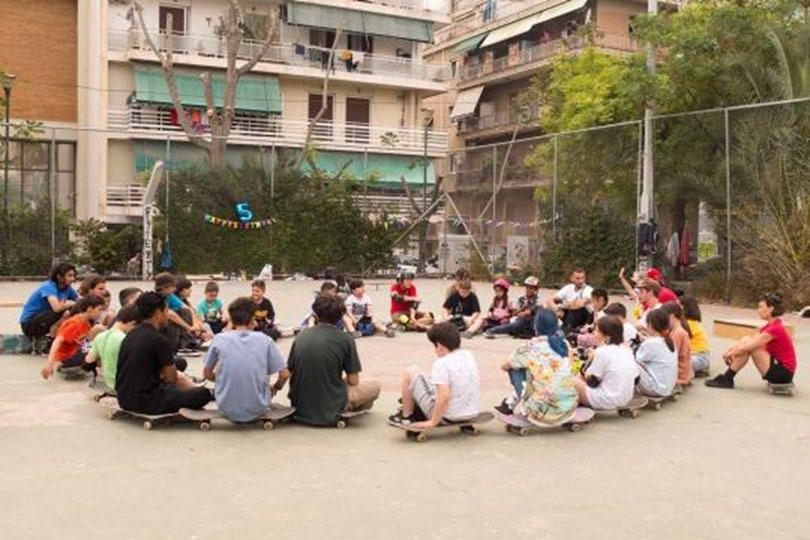



























The Open Boarders Network (OBN) operates with a participatory approach. It is coordinated by Skateistan, but from day one it has brought in individuals leading projects on the ground with displaced youth to inform the direction and aims of the network. OBN was founded in 2023 by Skateistan (global), Free Movement (Greece), 7Hills (Jordan), Skate Nation (Sweden) and Drop In e.V. (Germany). These partners established the aim and objectives of the network and then worked to locate new projects to join and share their experiences.
OBN has recently taken on four advisory members. These individuals have played a significant role in the network’s activities to date, leading projects with displaced youth on the ground in Uganda, Chile, Sweden and Germany. They will now work closely with Skateistan to ensure that OBN grows and develops to better support the community by hosting webinars on relevant topics and co-creating resources to benefit the whole network.
Ensuring the sustainability of their work is certainly the longer-term goal, and since many projects working with displaced youth have stated that their biggest challenge is access to funding, this is what we are directly addressing through access to funds and fundraising/sustainability support (Sibling Fund), as well as by hosting webinars on fundraising and sustainability in Spanish (with OBN advisory members leading on this in 2025).
In the shorter term, I believe that OBN has already set good foundations for ensuring the sustainability of projects reaching displaced youth around the world. The monthly network meetings give projects the space to learn from others — a mixture of emerging and well-established organisations working in the sector for over five or ten years — and to gain insights and support on challenges they are working to overcome.
Lessons learned and tips & tricks
One of the main points raised repeatedly by projects when discussing the lack of resources was that, even if some resources exist in the wider sport for development sector for the inclusion of displaced communities, they are often in the form of very long PDFs which are, firstly, not very practical and, secondly, not easily translated into different languages or adapted to different contexts.
Having a participatory approach from the very start of a network, and ideally the available funding and trust to onboard advisory members or a similar structure from the outset, can help ensure consistency
Additional resources
https://www.goodpush.org/blog/open-boarders-network-social-skateboarding-projects-supporting-inclusion-displaced-youth
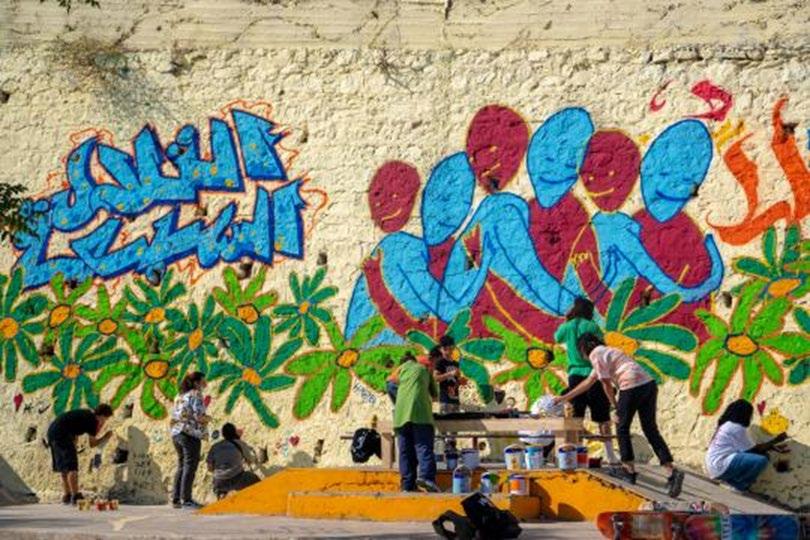



























Name of organisation
UNHCR Armenia (in partnership Football Federation of Armenia)
Country or countries of implementation
Lessons learned and tips & tricks
• Invest in grassroots inclusion: prioritise the participation of local and refugee children in community-based football programmes. Sport can be a powerful tool for fostering social cohesion, building life skills and supporting both physical and mental well-being from a young age.
Website of organisation (or initiative)
Armenia https://www.unhcr.org/am/en
Topic relevance
Learning through Play, Community development/inclusion and Coach engagement
Short description of the practice
Launched in 2021, „Playing Football for Integration” is a joint initiative by UNHCR Armenia and the Football Federation of Armenia (FFA). It provides regular, structured football training and match opportunities for refugee and local children across Armenia. The programme culminates annually in the „Solidarity Cup”, a national tournament engaging 16 mixed teams. As of 2024, over 300 children (50% refugees) are enrolled from eight provinces.
The initiative also includes an adaptive football component for children with autism and has received UEFA support through its „Football and Refugees” grant scheme.







Since 2021, UNHCR Armenia and the Football Federation of Armenia (FFA) have implemented two flagship initiatives focused on social inclusion through sport: the „Unity EURO Cup” (for refugee and local amateur adult players) and „Playing Football for Integration” (for children), culminating in the annual „Solidarity Cup”.
Building on this foundation, UNHCR and FFA co-developed the „Play Together for Integration and Unity” concept in 2023, selected by UEFA under its „Football and Refugees” grant scheme. With UEFA’s support, the initiative expanded in 2024 to include national tournaments with knockout rounds, engaging mixed refugee–host teams from across the country. Implementation follows a structured and community-driven approach:
• Selection of regions and recruitment of local clubs and coaches
• Outreach to refugee and host community families through schools and municipalities
• Training for coaches on inclusion, safeguarding and diversity
• Weekly football sessions across all sites
• Regional qualifiers and a national „Solidarity Cup” tournament
• Partnership events for visibility
• Continuous monitoring through school visits and parent feedback
Capacity-development/empowerment of local actors
Through coaching support, visibility and funding linkages, the initiative has empowered local clubs and municipalities to take ownership. In 2025, despite reduced UNHCR funding, the FFA independently continued the „Solidarity Cup”, demonstrating sustainability and partner commitment.















• Engage through presence: field visits to schools and training sessions offer invaluable insights into the real impact of the initiative. Direct engagement with children, coaches and families helps tailor support more effectively and fosters trust between organisers and communities.
• Build strong partnerships: the success of this initiative lies in meaningful collaboration. UNHCR served as a connector - bringing together municipalities, NGOs, embassies and private sector partners around shared values and a common vision. Simple acts, like UNHCR staff joining children on the field, helped humanise the project and reinforce its message.
• Foster ownership for sustainability: by anchoring the initiative within local structures and strengthening the capacity of partners, sustainability was ensured. Notably, in 2025 the Football Federation of Armenia continued the „Solidarity Cup” independently, demon strating local ownership and long-term impact beyond external funding.
Refugee children in Armenia unite to play football and create bonds in host communities | United Nations in Armenia: https://armenia.un.org/en/186673-displaced-children-armenia-unite-play-football-and-create-bonds-host-communities - “Solidarity Cup” Tournament Video: https://www.youtube.com/watch?v=QnO_M56slXo
A compelling production by the FFA, showcasing the final phase of the „Playing Football for Solidarity” initiative, reinforcing the role of sports in building stronger, more united communities.





Name of organisation
UNHCR Armenia (in partnership with Armenian National Paralympic Committee)
Country or countries of implementation
Armenia
Website of organisation (or initiative)
Topic relevance
Community development/inclusion
Implementation
Short description of the practice
Steps and process followed:
• Mobilisation and registration of national and refugee athletes with disabilities
• Coordination with local federations and disability organisations
• Inclusive event planning and logistics
• Engagement of municipal and national authorities for support and visibility
• Opening, competition and award ceremonies with broad stakeholder participation
Short description of the practice
The „National Sports Festival for Persons with Disabilities” is an annual multi-sport event in Armenia, held since 1994, and supported in 2024 by UNHCR Armenia, the Yerevan Municipality and the French Embassy.
The 20th edition featured 180 participants, including 21 refugees with disabilities. The event included athletics, wheelchair basketball, para weightlifting, para table tennis, boccia and more. Partner organisations included 12 NGOs focused on para sport.
Capacity-development/empowerment of local actors
The festival fostered coordination between local disability sport federations and introduced refugee athletes into their ecosystems. It created shared platforms for training and advocacy, and contributed to the National Paralympic Committee’s planning towards the Los Angeles 2028 Summer Olympics and Paralympic Games, particularly by promoting refugee inclusion in that planning.
Capacity-development/empowerment of local actors
The festival fostered coordination between local disability sport federations and introduced refugee athletes into their ecosystems. It created shared platforms for training and advocacy, and contributed to the National Paralympic Committee’s planning towards the Los Angeles 2028 Summer Olympics and Paralympic Games, particularly by promoting refugee inclusion in that planning.
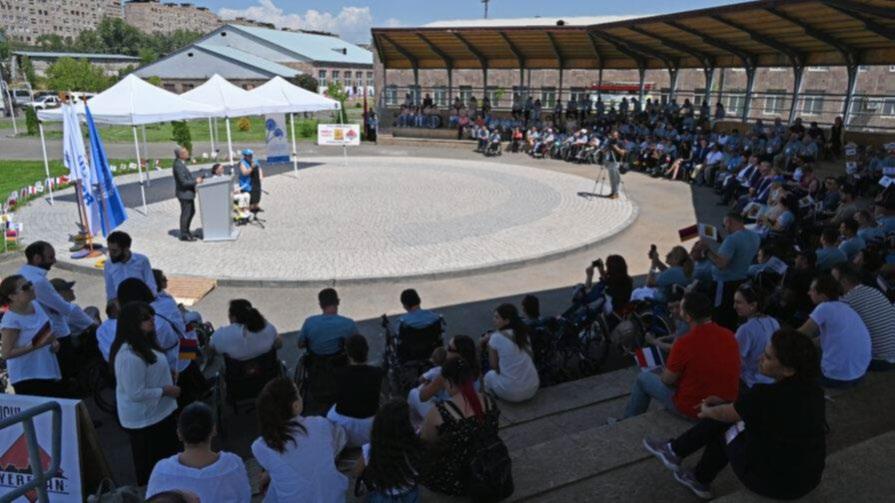



























Lessons learned and tips & tricks
• Integrate refugee athletes within national systems to ensure dignity and inclusion
• Leverage partnerships across local, international and municipal levels
• Sport can serve as a powerful bridge for social cohesion and trauma recovery
• Early planning and strong coordination with disability sport federations is key
• Recognition and celebration (e.g. medals, awards) significantly boost motivation
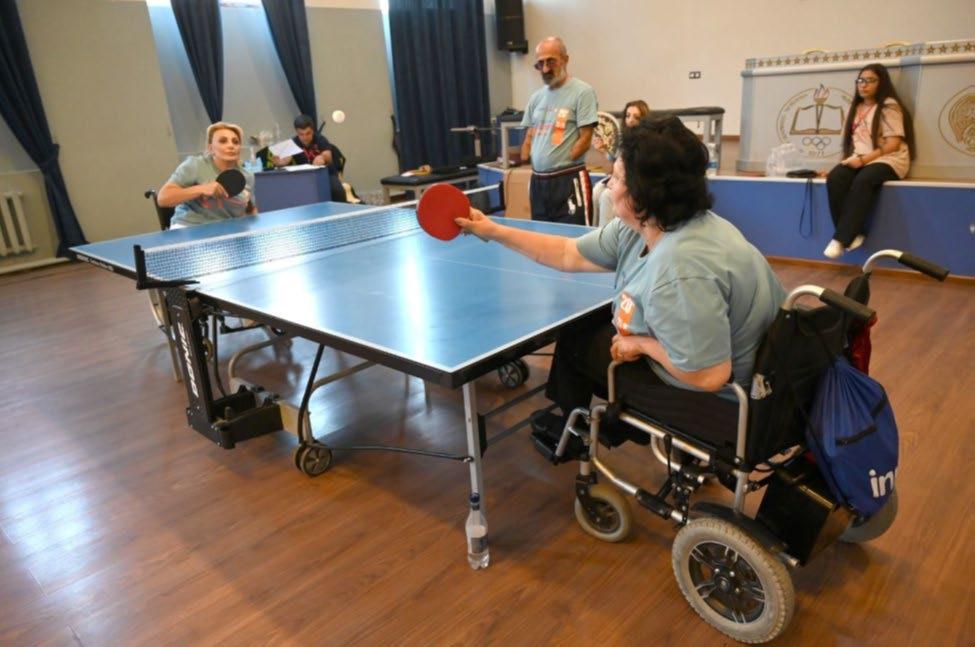
Additional resources
UNHCR ARMENIA PUBLICATIONS
1. Event Announcement – 20th Para Sports Festival www.unhcr.org/am/en/28747-28747.html
2. Festival Coverage – Armenia National Para Games Kick Off www.unhcr.org/am/en/28913-armenia-para-sports-festival-2024.html
3. Call for Applications – Participation in the Festival www.unhcr.org/am/en/27639-call-for-applications-para-sports-festival.html
FACEBOOK COVERAGE
UNHCR Armenia
• Festival Kick-Off Announcement www.facebook.com/UNHCRArmenia/posts/913522220807629/
• Congratulations to Winners www.facebook.com/story.php?id=100064495790214&story_fbid=915070857319432
• Para Table Tennis Highlights www.facebook.com/story.php?id=100064495790214&story_fbid=913716440788207
Armenian National Paralympic Committee
• Call for Applications
www.facebook.com/story.php?id=100064495790214&story_fbid=900113622148489
• Festival Announcement www.facebook.com/story.php/?id=100064515049360&story_fbid=1009074491253043



























Name of organisation
Yoga and Sports with Refugees
Country or countries of implementation
France, Greece
Website of organisation (or initiative)
https://yogasportwithrefugees.org
Topic relevance
Community development/inclusion
Short description of the practice
YSR’s gym in Ioannina runs various sport activities, but for the purpose of this survey we will focus on climbing classes. We run weekly climbing classes open to everyone - camp inhabitants, local climbers, volunteers and NGO staff from the community.
The goal is to facilitate community building, skills development and psychosocial support through the medium of indoor bouldering (a type of climbing).
Implementation
We teach participants the basics of bouldering: safety, techniques, warm-up methods and training steps. We also use the medium of climbing to create positive mental health outcomes, such as problem-solving, resilience, social skills and acceptance of failure.
Capacity-development/empowerment of local actors
Like all of YSR’s sport activities, climbing coaches are sought from the community of displaced people, who are the main target audience for the activity. Through this, local actors are empowered as coaches within YSR, but also beyond YSR as outdoor guides, climbing instructors or professional athletes once they have integrated into their host communities.
Investing strongly in coach training for individuals who show an interest is a key element. Upskilling them quickly means they can have a substantial impact for longer.
Involving the local community by running regular competitions and challenges really helps to foster a strong core group, since in many cases locals tend to stay much longer than the displaced community.
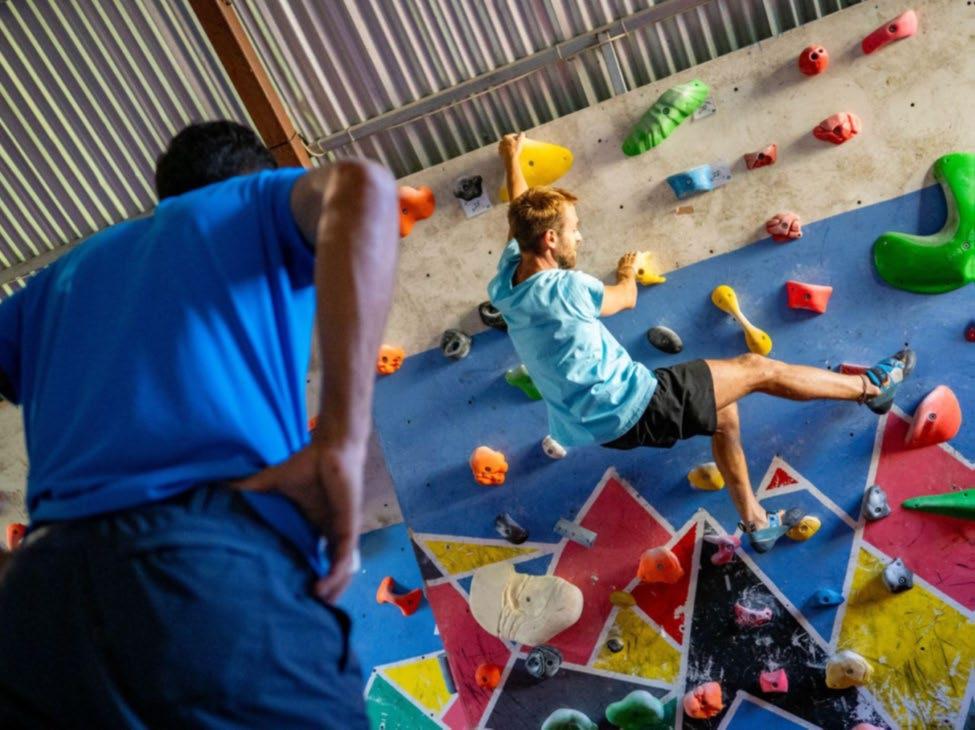
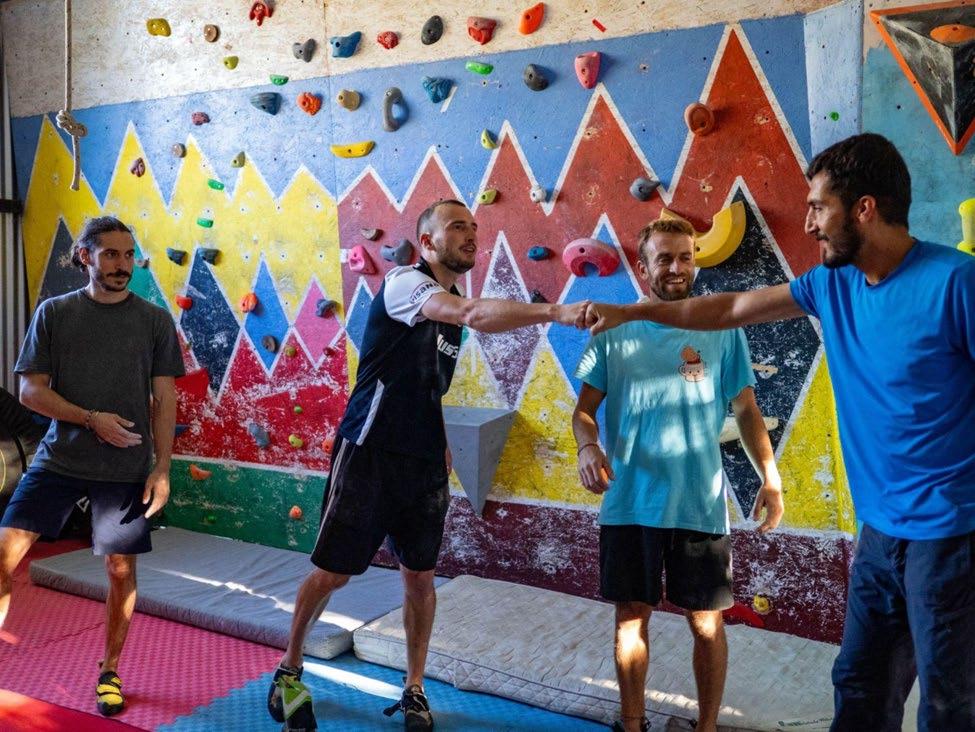



























Name of organisation
Country or countries of implementation
Website of organisation (or initiative)
Ukraine Active Ukraine https://ukrainian-active.org.ua/
Topic relevance
Learning Through Play, Community Development/Inclusion
Short description of the practice
The methodology developed by Ukraine Active includes: communication aimed at engaging refugee/IDP children and adults, as well as host community residents, in the organisation of inclusive sports events based on a festival format. Interaction pathways are adapted for schools and communities with high numbers of IDPs (refugees).
Key features:
• Interaction and communication of volunteers with IDPs (children and adults), including identifying cultural characteristics of their home regions and preferences for sports/games.
• Joint activities of volunteers, community residents and IDPs in organising inclusive sports events using the festival model.
• No focus on winning, scoring or results - no humiliation through loss.
• Mixed teams of IDPs (children and adults) and local residents.
• Gender-inclusive games for boys and girls.
• Independent resolution of disputes and rule violations by participants, following a special algorithm that enhances communication, co-operation and conflict prevention.
• Non-competitive environment with positive emotions from play, creating a safe, inclusive and psychologically comfortable atmosphere.
Partners involved: local schools, community associations, local governments, refugee associations.
The following steps and processes have been followed in the implementation:
1. Development of the methodology and preparation of training materials for festival-format events.
2. Preparation and co-ordination: signing memorandums with communities, educational, civic and sports organisations; obtaining permits.
3. Training: conducting special IRTS Active Forum training for teachers, coaches, volunteers and refugee activists (244 trained in Mykolaiv, Zakarpattia and Lviv regions).
4. Pilot testing: sports festival “Active School Games” with 27 schools from regions with the highest numbers of IDPs.
5. Practical implementation: community games with mixed teams of IDPs and host residents.
6. Experience-sharing: All-Ukrainian Active Forum and webinars on IRTS practices.
7. Scaling: integration into MOVE Week Ukraine 2025, which involved 1,590 schools, 150 communities and nearly 54,000 children (6,000 IDPs).



























Capacity-development/empowerment of local actors
Volunteers, teachers, coaches and local government representatives were trained in the methodology. Communities, host residents and refugees received practical tools to independently organise inclusive sports events, ensuring sustainability and replication.
Lessons learned and tips & tricks
Successes: Festival format (non-competitive, inclusive, stress-free), engagement of both IDPs and host children, strong support from teachers and NGOs, broad outreach via MOVE Week.
Challenges: Security restrictions, air raid alerts, disrupted schooling, the need for multiple permits, uneven participation of some communities, high stress levels and mistrust from some refugees.
Tips and tricks
• Non-competitive formats reduce stress and foster inclusion.
• Early involvement of local authorities ensures smoother implementation.
• Continuous and effective communication with refugees and host residents is essential.
• Training of volunteers, teachers and coaches is key to sustainability.
• Flexibility (e.g. extending MOVE Week under wartime conditions) increases participation.
• Mixed teams (IDPs + host children) naturally foster integration.

















Implementation
Information about organisation’s holder
Ukraine Active is a non-profit national organisation that promotes the development and popularisation of physical activity, well-being, fitness and sport for all in Ukraine, and is represented in all regions of the country. Every year, our organisation holds more than 50 events, popularising various sports among people of all ages and people with disabilities as well. We also organise educational seminars for specialists in the field of physical education and different kinds of sport in online and offline formats. Co-operation with Ukrainian governmental and non-profit organisations, together with international partnerships, allows us to implement European projects that were previously unavailable in Ukraine.










Name of organisation
Country or countries of implementation
Fostering Refugee Inclusion Through Karate in Montenegro - UNHCR Montenegro
Website of organisation (or initiative)
https://help.unhcr.org/montenegro/
Topic relevance
Community development/inclusion
Short description of the practice
Refugee children who found safety in Montenegro joined local children in open-door karate sessions, learning karate moves and building friendships. Local club partners of UNHCR Montenegro provide the venue and coaches.
Steps and process to follow in the implementation
• Previous high-level sport-related refugee inclusion events organised by UNHCR showed impact and payoff, so partners were very interested in and trusted UNHCR.
• UNHCR met with the president of the Karate Federation in Montenegro and the presidents of partnership clubs to advocate for this initiative and received great support from them.
• Established one pilot activity in an area where Ukrainian refugee children were mainly accommodated. After the success and positive feedback of this pilot, UNHCR further developed collaborations with local clubs and expanded the scope of services to reach more refugee children.
• UNHCR highly recognised local partners for their kindness and generosity on UNHCR’s social media after the pilot.
Capacity-development/empowerment of local actors
UNHCR highly recognised local partners for their kindness and generosity on UNHCR’s social media after the pilot
• Karate clubs agreed with UNHCR to waive the membership fees of refugee children to encourage participation and reduce economic barriers
• UNHCR is seeking more opportunities for refugee children to experience various sports and raise public awareness about refugees by involving sport stars. For example, UNHCR will cooperate with the national Karate Federation to organise a side event of the European Karate Championship, which plans to invite top players to teach a specific karate session for refugee and asylum-seeking children
Additional resources
Comms: Instagram
https://www.facebook.com/unhcr.montenegro/videos/588691417389744/
Document - Protection Brief-Refugees and Asylum seekers in Montenegro, January 2025
https://data.unhcr.org/en/documents/details/114381
Backgrounds: In Action: Teaming Up to Empower Refugee and Stateless Children in Montenegro through Sport | United Nations in Montenegro https://montenegro.un.org/en/273571-action-teaming-empower-refugee-and-stateless-children-montenegro-through-sport






















Lessons learned and tips & tricks
Partnerships with local sport club actors fostered the sustainability of this project
• UNHCR not only successfully delivered national-level major events but also designed thriving events for refugees to foster community-scale inclusion
• Karate sessions have the potential to expand the number of participants without costs rising, because of their one-to-many format. Other formats, like football, may have the same effect since the marginal cost of adding participants will not increase





Center for Healing and Justice through Sport
Name of organisation
Center for Healing and Justice through Sport
Country or countries of implementation
United States, Canada
Website of organisation (or initiative)
https://chjs.org
Topic relevance
Stress relief and mental health and psychosocial support, learning through play, coach engagement
Short description of the practice:
Practice goals:
1. Build community between organisations using sport as a tool for refugee engagement and integration
2. Provide applicable tools to coaches that support and enhance their programme implementation
3. Elevate the stories of resilience occurring amidst a very dangerous and erratic political climate, particularly for immigrants and refugees
4. Provide access to supporting materials and documents that can act as toolkits for coaches as they engage in programming
5. Create a safe and inclusive environment where all members
Capacity-development/empowerment of local actors
Using a train-the-trainer model, the practice has established a core group of trainers who will bring the knowledge and learning back to their own organisations. Using an editable and live tool, we will also continue to contribute resources and activities after the programme is complete.
Additional resources
https://docs.google.com/presentation/d/1kt61G-hGBQ_sfwAKeG_Rma_-hY4AEfjj/edit?usp=sharing&ouid=109453952163657508555&rtpof=true&sd=true
Lessons learned and tips & tricks
• Listen and learn first, build a programme around the needs of the participants
• Don’t rush — people will appreciate the opportunity to build com munity and trust before diving into activities or trying to get outcomes
• Share the mic — don’t just speak or facilitate yourself, invite other members to contribute their expertise to the space
• Work with each individual organisation on their schedules and then align everyone before trying to set when calls are
• Create a tangible takeaway for coaches and keep in touch about how they are able to implement some of the strategies
Information about organisation’s holder
The Center for Healing and Justice through Sport (CHJS) is a non-profit organisation dedicated to expanding access to healing-centred sport experiences for young people and athletes. Grounded in neuroscientific research demonstrating the physiological and psychological healing potential of sport, CHJS empowers coaches and teams through comprehensive training programmes, expert consultation and initiatives aimed at systemic change and collective action. Their mission focuses on harnessing the transformative power of sport to promote healing and foster positive development in young people, athletes and communities.



























COMPENSAR
Fundación Deportiva Elina Morales
Fútbol Más
Glasswing International
Name of organisation
Country or countries of implementation
Colombia
Website of organisation (or initiative)
https://corporativo.compensar.com
Topic relevance
Stress relief and mental health and psychosocial support, community inclusion and other early intervention and holistic wellness
• Initial outreach to shelters and temporary accommodation
• Trust-building and active listening
• Immediate assessment of needs and emotional state
• Inclusion in short-term physical activities for emotional regulation
• Referral to internal or partner services
• Integration into sport programmes with embedded socioemotional modules
Short description of the practice
This practice is based on providing initial care at the first voluntary point of contact between migrants and COMPENSAR. The goal is to establish trust and identify urgent needs while creating a foundation for longer-term inclusion. The programme works in collaboration with FAMIG and other actors to ensure that migrants are offered psychosocial support, basic needs and opportunities to participate in inclusive recreational and sport-based activities on COMPENSAR’s premises. The organisation also includes socioemotional development units in its sport curriculum, such as football, swimming and tennis, ensuring that every participant builds both physical and emotional skills.
Capacity-development/empowerment of local actors
Professionals in both the sport and psychosocial fields are trained to recognise emotional needs and deliver trauma-informed interventions. Curriculum development is adapted to age and emotional maturity. Evaluation tools enable staff to adjust programming and co-design better interventions with community members.
Lessons learned and tips & tricks
• Meet people where they are: build trust in safe, familiar environments
• Sport is a powerful entry point for emotional healing
• Combine technical (sport) and psychosocial (socioemotional) teams for greater impact
• Use brief, structured interventions to ensure even short stays have meaning
• Evaluate regularly and adapt based on real-time feedback






















Information about organisation’s holder
COMPENSAR is a Colombian social enterprise that works through an integrated model to improve quality of life for all populations.
Through its sport, health, education and employment programmes, it reaches migrants and refugees with a focus on dignity, inclusion and holistic wellbeing.





Name of organisation
Implementation
Capacity-development/empowerment of local actors
Country or countries of implementation
Glasswing International Regional initiative Latin Amerika
Website of organisation (or initiative)
https://glasswing.org/es/
Topic relevance
Stress relief and mental health and psychosocial support, learning through play, community inclusion
• Diagnosis and contextualisation: identify emotional and environmental needs of students and their communities
• Training: volunteers and educators are trained in the Take 5 methodology, trauma-informed approaches and facilitation
• Implementation: weekly sport sessions are conducted in schools
• Monitoring and support: coordinators provide technical assistance and feedback loops for facilitators
Community and youth volunteers are at the core of Take 5. The programme empowers them with tools to support children’s emotional development, lead inclusive sport activities and serve as positive role models. Training builds their knowledge of psychosocial support, leadership and communication. Schools also adopt the methodology long term, integrating it into their extracurricular or psychosocial support programming.
Short description of the practice
Take 5 is a psychosocial support methodology developed by Waves for Change in South Africa and adapted by Glasswing International as part of its Community School Programme. The methodology is applied across extracurricular clubs - such as sport, arts, robotics and leadership — in vulnerable public schools across Latin America.
Its main goal is to promote emotional well-being and resilience through structured, inclusive, play-based sessions. Activities include physical warm-ups, cooperative games, breathing techniques, body awareness and guided reflection to help children self-regulate, reduce stress and build social-emotional and life skills like empathy, teamwork and confidence. Trained community and youth volunteers lead weekly sessions in eight countries. The approach emphasises gender equity and inclusion, creating safe, predictable environments that foster a sense of belonging and help young people process adversity while building agency and purpose.
Glasswing staff were formally trained in Take 5 by Waves for Change and continue implementing it as part of the regional Community School framework, working closely with schools, municipal governments and international partners.
Lessons learned and tips & tricks
• Keep sessions simple, consistent and engaging — repetition helps children internalise tools
• Invest in training and emotional support for facilitators
• Involve school staff and parents early to ensure buy-in and continuity
• Start with pilot groups and adapt based on feedback
• Create safe, predictable spaces — emotional safety is key to learning
Short description of the practice:






















Information about organisation’s holder
Glasswing International is a non-profit with a regional presence in Latin America and the Caribbean. We design and implement education, health and community development programmes that empower youth and communities facing adversity. Our Community School model and psychosocial methodologies like Take 5 have been implemented across eight countries, reaching hundreds of thousands of students, families and educators. We promote multisectoral collaboration, local ownership and scalable interventions for sustainable impact.





Name of organisation
Fundación Deportiva Elina Morales
Country or countries of implementation
Colombia
Website of organisation (or initiative)
https://www.instagram.com/fundacion-
Topic relevance
Stress relief and Mental Health and Psycho-social Support, Community inclusion
In the implementation, the following steps and processes have been followed:
• Community mapping to identify migrant and disabled participants
• Design of inclusive sports sessions with appropriate adaptations
• Coordination with community leaders and local organisations
• Implementation of short tournaments and recreational games
Short description of the practice
Short description of the practice:
The ALAS project integrates migrant and refugee participants with people with disabilities in inclusive sports activities, especially through short-format women’s football tournaments and adapted recreational events. These activities are designed to create safe, joyful spaces where empathy, teamwork and social cohesion are built through play. Sport serves as a tool to foster dialogue, build leadership and create visibility for often marginalised populations.
Capacity-development/empowerment of local actors
By involving local women and youth as facilitators, referees and coordinators, the practice has helped to build inclusive leadership. These actors receive training on disability rights and migration issues, empowering them to sustain inclusive sporting spaces in their communities beyond the life of the project.
Lessons learned and tips & tricks
• Plan for inclusion from the start, not as an afterthought
• Use sport as a neutral, joyful entry point to build trust and cohesion
• Promote leadership among the participants themselves
• Highlight personal stories to shift public perception around disability and migration






















Information about organisation’s holder
Elina Morales Sports Foundation is a non-profit organisation based in Colombia that uses sport, physical activity and body wellness as tools for social transformation, gender equity and the inclusion of populations in vulnerable situations. With an intersectional and human rights-based approach, it promotes autonomy, leadership and self-care among migrant, refugee and survivor women through programmes such as ALAS. Its model integrates technical training in practices such as massage therapy with processes of emotional healing, community strengthening and economic empowerment, creating sustainable pathways for integration and well-being.





Name of organisation
Fundación Deportiva Elina Morales
Country or countries of implementation
Colombia
Website of organisation (or initiative)
https://www.instagram.com/fundacion-
Topic relevance
Stress relief and Mental Health and Psycho-social Support, Community inclusion
The initiative is complemented by access to psychosocial support and peer networks to reduce isolation and foster collective healing. Partners include local clinics, sport institutions and shelters for migrant women.
In the implementation, the following steps and processes have been followed:
• Participant identification and orientation, prioritising migrant and refugee women in vulnerable conditions
• Psychoeducational sessions on trauma, emotional regulation and women’s rights
• Technical training in massage therapy with certified instructors.
Short description of the practice
As part of the ALAS project (Autonomía, Liderazgo y Autocuidado para la Sanación), implemented in Colombia by Fundación Deportiva Elina Morales, this initiative uses masotherapy — a sport-related wellness practice — as both a healing and economic reintegration strategy for migrant women.
Participants attend regular training sessions combining technical instruction in massage therapy with workshops on mental health, self-care, gender-based violence prevention and rights awareness. The methodology integrates movement-based relaxation, physical activation and therapeutic touch to promote wellbeing.
Short description of the practice:











• Practice labs and community sessions offering massage services in sport and wellness settings
• Ongoing mentorship and support, including job placement guidance and cooperative business models
• Monitoring and reflection to track emotional, social and economic progress
Lessons learned and tips & tricks
• Link vocational training to wellness and sport to expand integration pathways
• Combine emotional healing and technical training for sustainable impact
• Involve participants in co-design to ensure cultural relevance
• Build local partnerships early (e.g., sport clubs, health centres) for long-term sustainability
Capacity-development/empowerment of local actors
The programme has trained migrant women not only in masotherapy but also in leadership, peer mentoring and cooperative management. Graduates have formed local support groups and have begun providing services in community sport settings, women’s centres and informal markets, generating income and visibility.











Information about organisation’s holder
Elina Morales Sports Foundation is a non-profit organisation based in Colombia that uses sport, physical activity and body wellness as tools for social transformation, gender equity and the inclusion of populations in vulnerable situations. With an intersectional and human rights-based approach, it promotes autonomy, leadership and self-care among migrant, refugee and survivor women through programmes such as ALAS. Its model integrates technical training in practices such as massage therapy with processes of emotional healing, community strengthening and economic empowerment, creating sustainable pathways for integration and well-being.





Name of organisation
Implementation
Steps and process followed:
Country or countries of implementation
Fútbol Más Chile and El Salvador
Website of organisation (or initiative)
https://www.futbolmas.org/
Topic relevance
Stress relief and mental health and psychosocial support, learning through play, community inclusion
• Context assessment to identify community risks and protective factors
• Curriculum design incorporating football and life skills
• Recruitment and training of facilitators
• Implementation of weekly sessions and community events
• Monitoring and follow-up to track emotional and behavioural changes
Short description of the practice
Fútbol Más works through weekly training sessions, community engagement and football festivals to promote social-emotional learning among children and adolescents.
In Chile, it serves migrant children from Haitian, Venezuelan and Peruvian backgrounds, and in El Salvador, children in mobility and social risk. Activities blend football with emotional skills development under a trauma-informed approach, using the power of sport to foster inclusion, mutual respect and belonging.
Capacity-development/empowerment of local actors
Local leaders and volunteers are trained in Fútbol Más’s methodology to continue leading sessions and organising activities. The programme builds local ownership by involving parents, schools and community leaders in the design and implementation, creating a support network that sustains engagement beyond project cycles.
Lessons learned and tips & tricks
• Blend sport with psychosocial goals for higher participation and impact
• Engage local communities from the start to ensure cultural relevance
• Use consistent routines in sessions to build emotional safety
• Train facilitators in trauma-informed care and communication
• Co-create the programme with youth for better ownership and outcomes
Short description of the practice:






















Information about organisation’s holder
Fútbol Más is a non-profit organisation founded in Chile that uses the power of play and sport to promote well-being, inclusion and development for children and communities facing vulnerability. With a presence in Latin America and Africa, it partners with governments, schools and civil society to implement programmes that build emotional skills and social bonds.





Name of organisation
Glasswing International
Country or countries of implementation
Regional initiative Latin Amerika
Website of organisation (or initiative)
https://glasswing.org/es/
Topic relevance
Stress relief and mental health and psychosocial support, community inclusion
Implementation
Steps and process followed:
• Participatory diagnostic with schools and communities to identify relevant emotional or social themes
• Design of session guides adapted to local context and languages
• Facilitator training for educators and local staff in community -based dialogue and emotional support
• Implementation of cafés every school term, fostering horizontal conversation and emotional safety
• Feedback loops and adaptation based on participant input and evolving needs
Short description of the practice
Community Cafés are participatory, dialogue-based gatherings held with parents, teachers and community members as part of Glasswing’s Community School Programme. These sessions explore emotional well-being, parenting and inclusive education through group conversation, collaborative activities and guided reflection. Specific topics include the importance of play, migration experiences, intercultural coexistence and mental health.
Cafés are designed to support adult participants — many of whom are migrants themselves — in developing tools for emotional regulation, stress management and active involvement in school life. The practice promotes collective responsibility and strengthens community–school relationships.
Capacity-development/empowerment of local actors
Local school staff and Glasswing community coordinators are trained to lead cafés and gradually take ownership of the process. The reflective methodology enhances their capacity to address emotional and social challenges with empathy and structure. By reinforcing trust and shared responsibility, the practice builds stronger school–community ecosystems that can support migrant and vulnerable families in the long term.
Lessons learned and tips & tricks
• Prioritise listening and co-construction rather than top-down instruction
• Adapt themes to local context and participants’ lived experiences
• Keep language accessible and activities dynamic
• Train facilitators in emotional first aid and inclusion principles
Information about organisation’s holder
Glasswing International is a non-profit with a regional presence in Latin America and the Caribbean. We design and implement education, health and community development programmes that empower youth and communities facing adversity. Our Community School model and psychosocial methodologies like Take 5 have been implemented across eight countries, reaching hundreds of thousands of students, families and educators. We promote multisectoral collaboration, local ownership and scalable interventions for sustainable impact.










































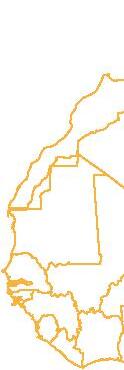

























Name of organisation
KLABU Foundation
Country or countries of implementation
Implementation
Steps and process to follow in the implementation
1. Community engagement: identifying participants and raising awareness about the benefits of yoga
Website of organisation (or initiative)
Topic relevance Kenya https://klabu.org
Learning through Play
2. Identifying qualified local yoga instructors: we worked with Yoga Alliance to identify qualified instructors in Kalobeyei and Kakuma
3. Conducting sessions: regular weekly group yoga sessions in a safe and inclusive environment
4. Feedback and adaptation: regular feedback from particpants via questionnaires provided by Yoga Alliance to monitor and improve the programme
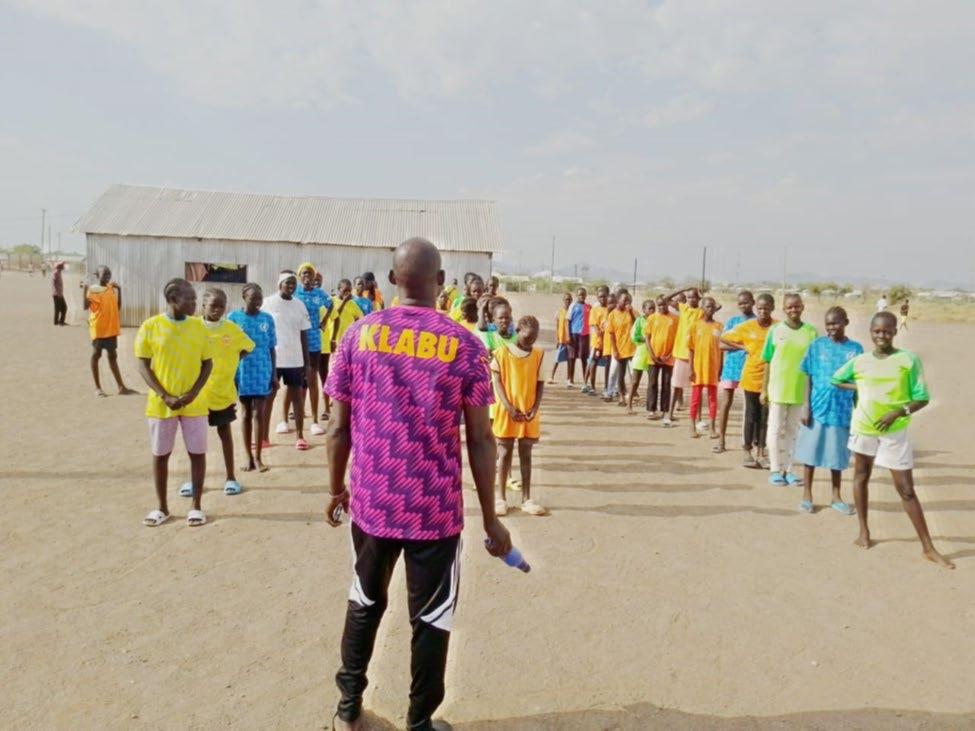
Short description of the practice
Goals: improve mental well-being, reduce stress, enhance physical health and foster community cohesion
Activities: weekly guided yoga sessions, breathing exercises and mindfulness practices
Type of sport: yoga and meditation
Partners involved: Yoga Alliance, local KLABU staff members from the refugee community
Capacity-development/empowerment of local actors
Local community members are trained as yoga instructors by Yoga Alliance. We pay them a meaningful income to support their practice and connect them to other organisations that are active in Kalobeyei or Kakuma.
Lessons learned and tips & tricks
• Building local capacity is essential for sustainability
• Community involvement in the design of the programme improves long-term impact
• A safe and welcoming environment is key to participation

















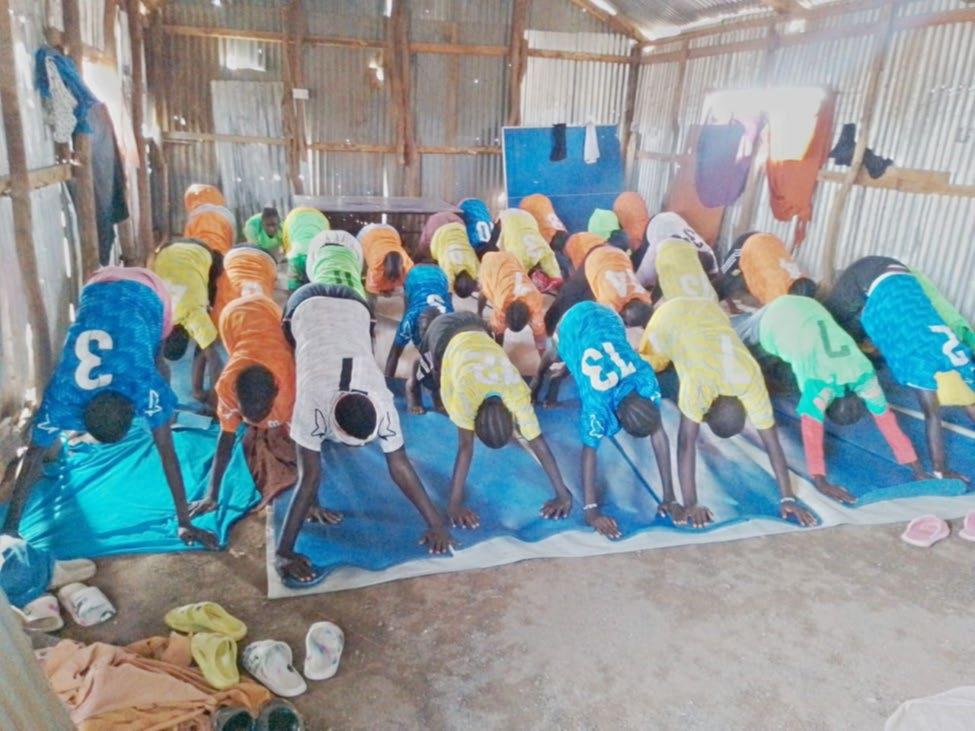
Additional resources
https://www.instagram.com/p/DA8km65IFBa/?img_index=1










Good example - The Middle Eeast
Name of organisation
The program begins with a call for applications to reach potential participants. Inclusivity is key at this stage, ensuring that the targeted groups feel represented and welcomed. Outreach is conducted both online, through social media, and offline, via partners with established refugee and Lebanese youth networks. The approach highlights the opportunity for young people to become entrepreneurs and create something of their own, which motivates them to apply and engage with all the challenges presented in the sports field in Lebanon and generally in the country. It also emphasizes the support provided by the program, giving participants the chance to learn from experts and receive guidance on piloting and launching their projects, something most Syrian refugee and vulnerable Lebanese youth do not usually have the chance to experience.
Short description of the practice
Through tailored programming and mentorship, the initiative provides young people with guidance on developing sports-related businesses or social initiatives, despite legal restrictions - such as the inability of Syrian refugees in Lebanon to register businesses. The program supports participants at every stage, helping them understand how to start, scale, and operate their projects within legal and contextual frameworks, while fostering their skills and entrepreneurial potential. The practice also focuses on inclusion and outreach for refugee youth, ensuring that program communications and materials reflect and represent the participants.











Selected participants then join a four-day boot camp, where they present and further develop their ideas. The boot camp also provides space for team-building through sports activities, allowing youth to connect, bond, and share their common interests in street sports culture.
These connections lay the foundation for collaboration and mutual support and understanding throughout the rest of the program.
They then take part in a six-month journey of learning to present their projects at the end and apply for the grant.
Capacity-development/empowerment
The practice is part of the Street Sports Incubator, an entrepreneurial program for youth. It addresses the socio-economic needs and aspirations of Lebanese and Syrian refugee youth in Lebanon by equipping them with practical skills and knowledge to develop sports-related businesses or social initiatives. The program responds to their challenges by strengthening soft and social skills, boosting confidence, and fostering leadership abilities. Additionally, it builds on their existing creativity and entrepreneurial potential, providing opportunities to access seed funding and financial support to implement their projects, transforming their capacities into tangible economic and social opportunities.
















Lessons learned and tips & tricks
Some barriers also emerged, particularly among refugee youth. For example, certain participants faced challenges balancing family responsibilities, as some were married or preferred not to attend without a family member present. These challenges were addressed by adapting the program—allowing family members to join when necessary and offering flexible participation options—ensuring that all youth could access the essential knowledge needed to continue in the program.
Tips & Tricks:
• Provide visible and consistent support: Make sure participants know they are fully supported and emphasize a shared goal that brings them together.
• Create space for focus and connection: In programs that are more technical than sports training, it is essential to minimize outside distractions so participants can fully engage and build meaningful relationships.
• Engage experts and ensure equal treatment: Have knowledgeable staff or external experts available to guide youth, while treating all participants equally to foster trust and create a positive community around the activities.
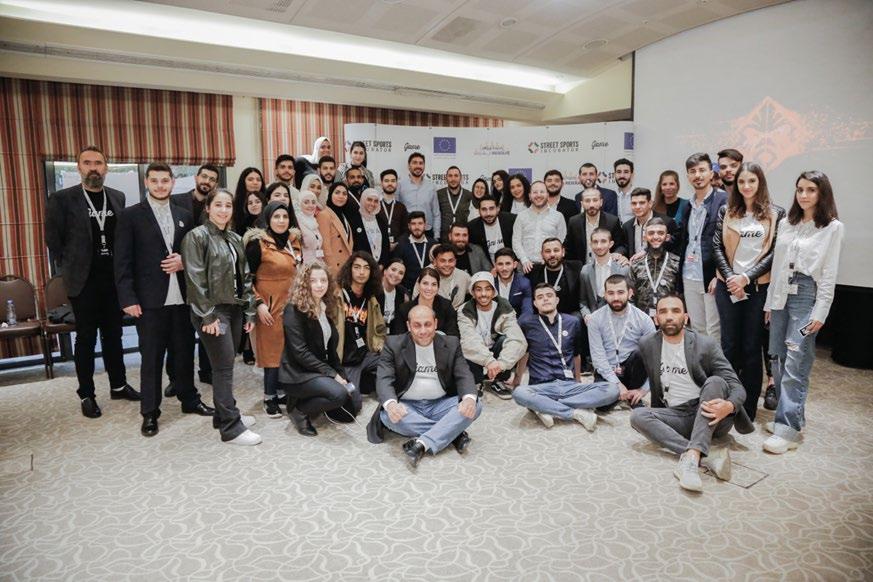
Information about organisation’s holder
GAME is an international top-150 youth-led NGO, founded in Denmark in 2002 with activities in Europe, the Middle East, and Africa. Founded on an empowerment approach, GAME creates an impact for 1,600+ young role models, thousands of children, and their communities while strengthening equity in opportunities, health, diversity, gender, and inclusion. The programs are aligned with the UN’s SDGs—in particular, Goal 3 (Health), Goal 5 (Gender Equality), and Goal 11 (Sustainable Cities and Communities)—with social stability, entrepreneurship, and sustainability as a strong focus.


























